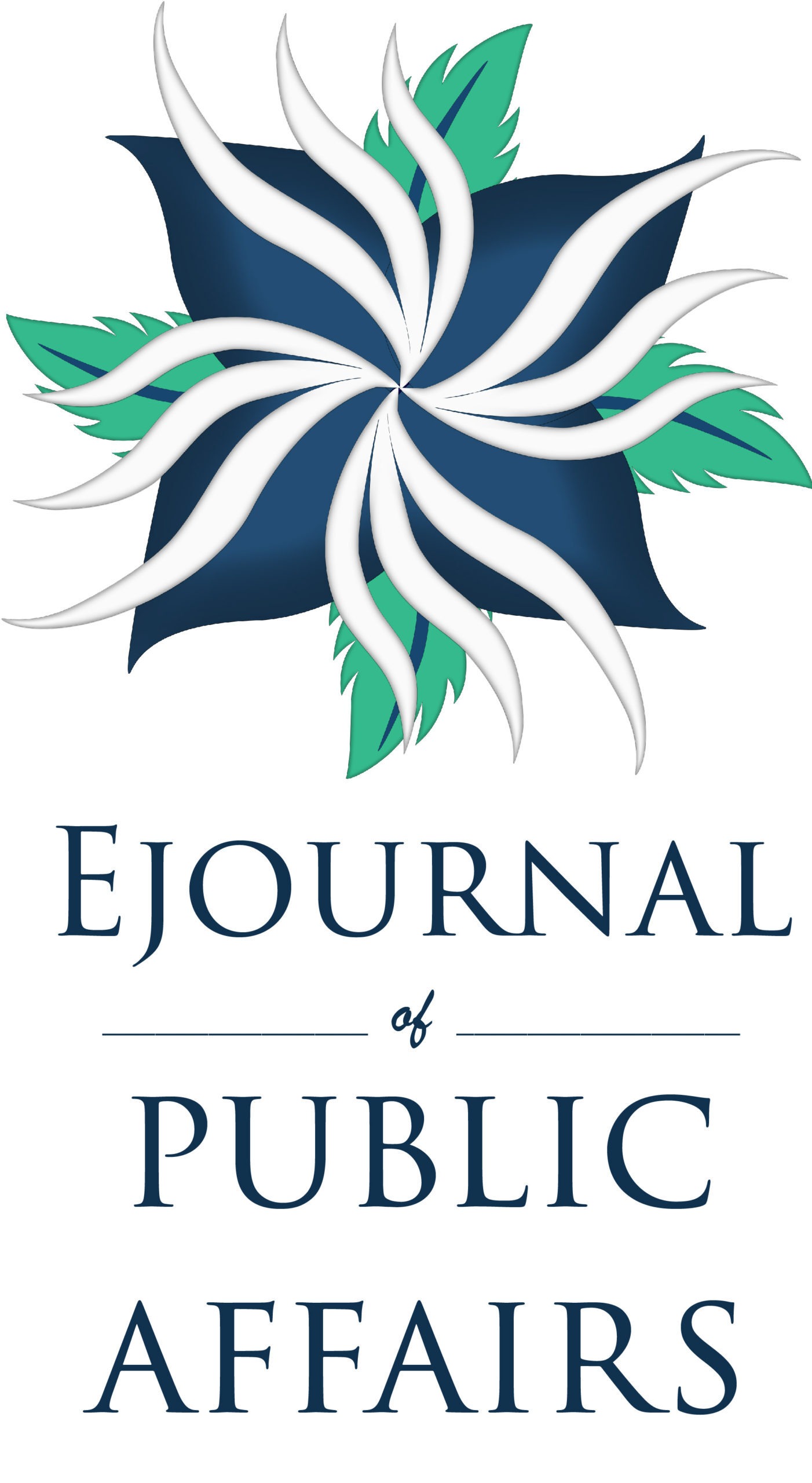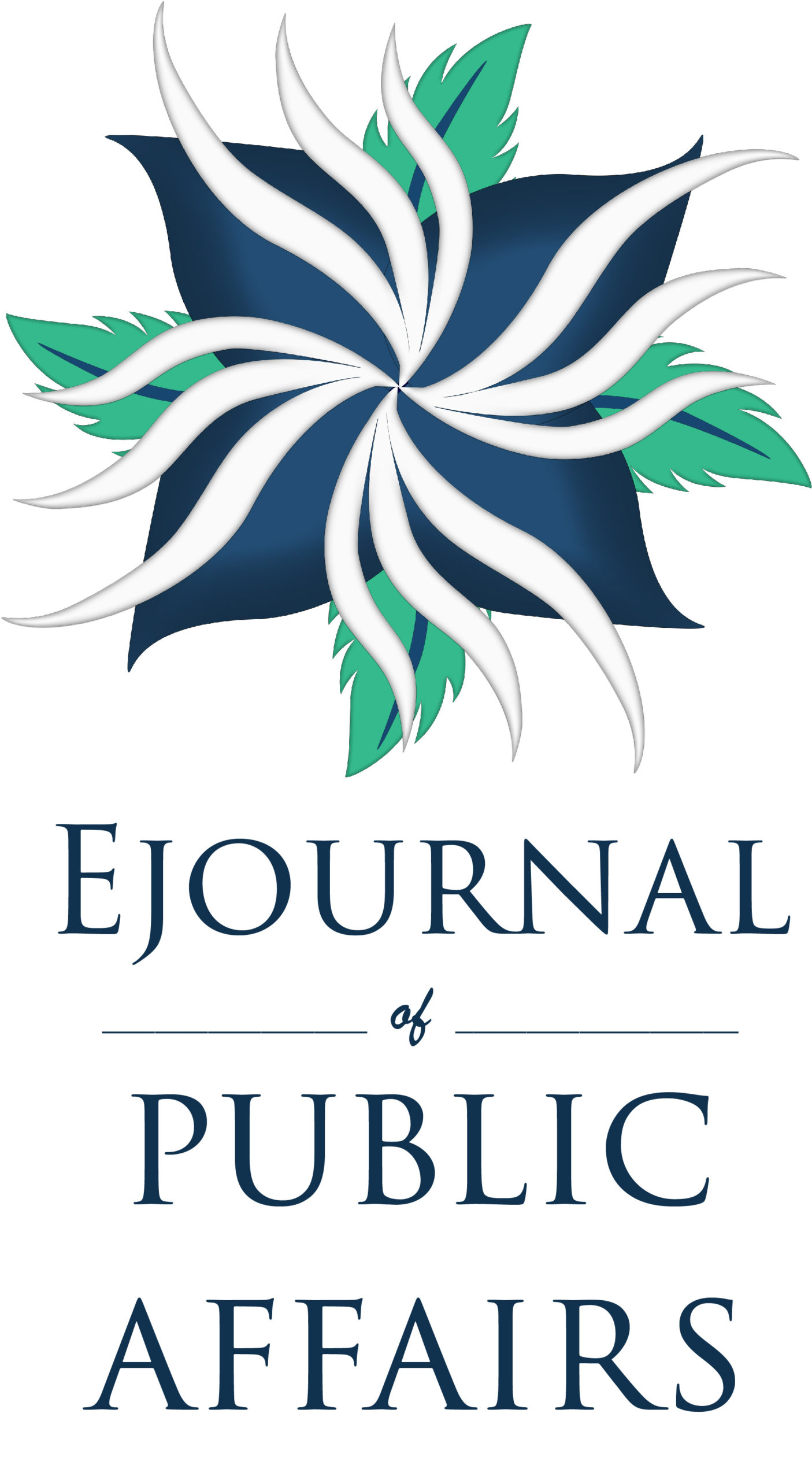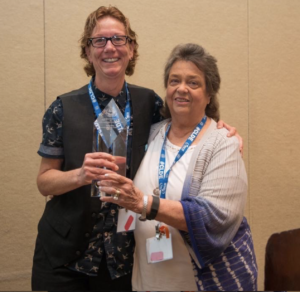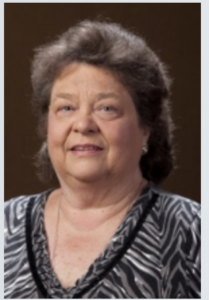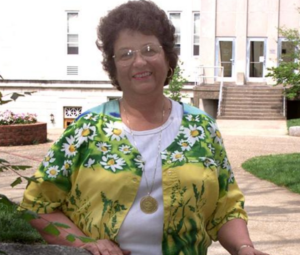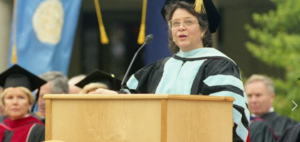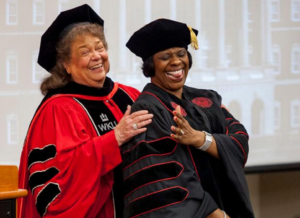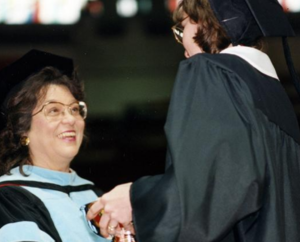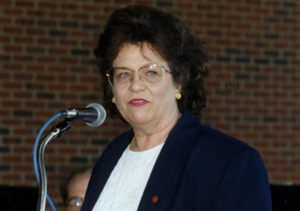A memorial and tribute to a great leader and friend of the American Democracy Project,
Dr. Barbara Burch (August 21, 1938 – January 5, 2020)
Introduction
This memorial project, like so many other things, started in an unplanned way. Felice Nudelman and I, mourning the loss of our dear friend Barbara Burch, thought about what we might do to commemorate her life. She asked if I would write something about Barbara and her life of service. Because I wanted to capture memories from those whom she had inspired and helped, I reached out to three friends: David Lee, Molly Kerby, and Paul Markham. All three had or do work at Western Kentucky University; all three had been mentored by Barbara. I felt like their comments would be the truest representation of Barbara’s legacy. I would simply add my perspective, sometimes keying off their perspectives.
Of course, Felice was also thinking about others as well. She asked Molly Kerby to include something in a forthcoming issue of the eJournal of Public Affairs, a publication that began as a joint project of the American Democracy Project (ADP) and Missouri State University. So I asked Molly if she would be willing to include her very thoughtful piece in this larger collection. I asked David and Paul to join her as other leaders at Western Kentucky who had been enormously influenced by her support. As you can see below, they generously included their thoughts and perspectives. I think this four-part narrative provides a much richer view of Barbara and her contributions than anything done by any one of us. I am indebted for their insights and perceptions which make this a much more encompassing view of our amazing friend Barbara.
George Mehaffy
Senior Advisor, Sova Solutions, former Vice President, AASCU and co-founder of the American Democracy Project (ADP)
I first met Barbara when she and I were in the California State University System, albeit in different institutions. We met again at my very first AASCU Academic Affairs Meeting in Annapolis in July 1999. Ironically, I had been a provost for 5 years, serving at an AASCU institution but had never attended an AASCU meeting until I was appointed as a vice president at AASCU. Barbara was one of the small but faithful group that came that summer, one of only 38 provosts in attendance. But that gave me the opportunity to get to know her. And immediately, I was struck by her thoughtfulness, as well as her humor. If I were to have described her from that initial impression, the word I would have used was “wise.” She was insightful, experienced, and reflective. And she was fun to talk to.
Several years later, I read Bowling Alone by Robert Putnam. He described the decline of all sorts of social groups that created bridging social capital, so vital to the health of a democracy. Felice and I wondered what higher education might do to respond. We started to make a list of provosts whom we wanted to talk with at the AASCU Winter Meeting in February 2002. Barbara was one of the first I thought about. We gathered a group of 15 provosts together at that winter meeting to talk about what we might do to improve civic outcomes for AASCU undergraduates. Over the next year and a half, at both that meeting and two more academic affairs meetings, we met with that group to talk about possible actions we might take. Out of those discussions, the American Democracy Project was born. Not surprisingly, Barbara was always at the forefront of those conversations, suggesting ways to fit the work into the culture and values of higher education. Many of her ideas became core elements of the project. For example, she talked about how to engage presidents in the project. But most of all, she talked about how to engage other academic leaders and the faculty.
I knew from her work that Western Kentucky University would be a leader in civic engagement. But I was still surprised to watch how engaged and creative the WKU campus became. Many WKU leaders emerged to do local projects on the campus but many others participated in a wide variety of national projects as well. Once Barbara was committed, she was all in. One of the funny stories I remember was about Tom Ehrlich’s new book, Educating Citizens. Tom had been our keynote speaker in July 2003 when we launched the American Democracy Project at our Snowbird, Utah academic affairs meeting. After the meeting, we made an arrangement with the publisher to sell discounted copies of Educating Citizens to AASCU schools. Tom called me one day and reported that WKU had bought 600 copies, the largest by far of any sale to a single university. I called Barbara to ask why they had purchased such a large number of books. She said she gave one to each faculty member at WKU. I remember teasing her, saying I wasn’t sure about this notion of provosts giving books to faculty members. Where might that madness end? But it illustrated her commitment to the project.
The first John Saltmarsh Award for Emerging Civic Leaders was given to two faculty members, one of them Paul Markham, a member at that time of the WKU faculty, and someone who viewed Barbara as a mentor. That award to Paul symbolizes one of Barbara’s great gifts; she worked to help faculty succeed, in their faculty roles but especially if they wanted to move into administrative roles. If you read the lovely tributes by David Lee, Molly Kerby, and Paul Markham that follow, you will hear of the support that Barbara gave routinely and gladly to others to help them succeed. Barbara was generous with her time and her ideas. She found joy when others succeeded. As Molly notes, ADP named an award in her honor, the Barbara Burch Award for Faculty Leadership in Civic Engagement. That award is emblematic of Barbara, who was deeply committed to faculty and their success.
She was incredibly wise in her counsel. In his memorial, David Lee describes a wonderful moment when he was upset about a mistake a department chair had made and was considering terminating him. Barbara’s wise advice, so beautifully illustrative of Barbara’s approach to leadership, caused him to reflect.
And that characteristic about helping others was at the heart of her leadership. It was seldom if ever about Barbara. It was always about the work. She helped people succeed for the joy of seeing their growth and success but she also knew that in helping others become better leaders, she was strengthening the institution so it could do the vital work of educating students.
In much of my life, in higher education, in the Coast Guard and other circumstances, the leaders who have made and continue to make a difference are those who are not focused on themselves but others. Barbara exemplified the concept of servant-leader.
Yet that leadership was not all soft power and graciousness. Barbara also had a spine of steel and was quick to react to crazy ideas and distorted values. David provided two glimpses to that in his recollections. He reported that in her long service as provost, she was not always liked, and like most leaders, experienced less support at the end of her term as provost. Yet 4 years later, she ran unopposed as the faculty regent, because faculty knew that she would support them wholeheartedly. It was always about the work, not about Barbara. I remember her calling me to tell me she had been elected as the Faculty Regent. She started the conversation by suggesting that her election might create a cardiac emergency for the president, as she knew where all the bodies were buried, and she was committed to doing the right things to help WKU succeed. It never was about Barbara; it was always about the work. Paul Markham, in his wonderful recollection about Barbara, underscored her commitment to always do the right thing.
I hope you will take a little more time to read the eloquent and moving tributes from David, Molly, and Paul, three people who knew Barbara best as a mentor, a coach, and a friend. As for me, I mourn her death as the loss of a great friend but even more as a great leader that helped me be better in my job. I always looked forward to some quiet time with Barbara at our academic affairs meetings, to catch up, laugh, reflect on the wicked, and think about the next set of ideas and projects to help students succeed. I will miss her wise counsel and dear friendship. But I will also cherish her role as a remarkable leader who touched the lives of so many. She left an enduring legacy about the importance of being a leader who cared more about others than herself, who cared more about fixing problems than assigning blame, and who cared more about the work than the pettiness that sometimes surrounded it.
David Lee
Faculty Member and Former Provost
Western Kentucky University
As a provost who served some years after Barbara left that position, David was in a unique position to understand her work.
One of the things that always impressed me about Barbara was that her leadership was invariably built on positive assumptions. I’ve always kept in mind a great piece of management advice she once gave me. I was very unhappy with a mistake a department head had made, and I was seriously considering a leadership change. But Barbara said, “If you are looking for a department head who doesn’t make mistakes, you’re going to look for a long time. What’s more important is what do they do after they make a mistake.” The comment was very characteristic of Barbara. She wanted solutions that were positive, not punitive. Whether she was working with a student or a department head or a dean, she was always looking for ways to help people be successful. Part of her strength as a leader was the enormous pleasure that she took in the success of other people.
Barbara’s election as Faculty Regent is a great illustration of the confidence the campus had in her ability and her goodwill. Her 14 years as Provost is a remarkably long tenure these days, and her time in the office included all of the tensions, conflicts, and controversies that go with that job. At times, she was very unpopular with the faculty, and the campus was probably ready for a change when she stepped down as Provost in 2010. Yet just four years after she left the Provost’s Office, that same faculty elected her to a three-year term as their representative on the university’s Board of Regents. She ran unopposed.
I think her election as Faculty Regent reflects a couple of things. First of all, it illustrates her life-long commitment to service. At a stage in her life when she might have been looking for fewer and lighter responsibilities, Barbara was instead looking for more ways to serve. In that sense, her career is very much in the spirit of the American Democracy Project. Secondly, it’s a striking thing to move from being the Provost to the elected faculty representative on the university’s governing board. Those are very different roles, and it takes a truly remarkable person to succeed in both of them. I think Barbara was able to do it because the campus understood that in any role she assumed, her deepest commitment was to the betterment of the university community as a whole. Her support for the American Democracy Project reflected the values that shaped her entire career.
Molly Kerby
Faculty Member, ADP Coordinator and Assistant Provost for Institutional Effectiveness
Western Kentucky University
Molly had already prepared this remembrance. I asked if we could incorporate it into the four-part tribute.
We all have personal stories about the loss of people we respect, admire, and aspire to be. These are the leaders who served as our role models and mentors; the ones who helped shape our careers and lives and, without them, we would not be where we are today. Some of them lovingly nurtured us to ensure our growth and maturity. Some of them stood firm with us in solidarity during turbulent times. Some of them were uncompromisingly tough on us because they had faith in our ability to do better. And, some of them were all of these. But, most importantly, they left a lasting legacy that carries on through the work and lives of the individuals they touched. Dr. Barbara Burch, Provost Emeritus at Western Kentucky University, was one of those leaders.
Barbara Burch [née Gagel] was born on August 21, 1938, and was the eldest of five children. In 1956, she married the love of her life, Kenneth Burch, and the couple had two children, Kevin and Kelly. She earned a bachelor’s degree in education from Western Kentucky University (WKU) and completed her master’s and doctoral degrees at Indiana University. In 1996, Barbara returned to WKU, as the Vice President of Academic Affairs. “Provost” was added to her title in 1998; she held those positions until 2010. After stepping down as Provost and Vice President for Academic Affairs, Barbara began to focus much of her energy on the Educational Leadership Doctoral Program at WKU as a faculty member and mentor, as well as serving on the University’s Board of Regents. In 2018, she founded the Kelly M. Burch Institute for Transformative Practices in Higher Education named in honor of her late daughter:
“Created to act like a small business incubator for issues that affect higher education, the [Kelly M. Burch] Institute uses an evidence-based approach to examine what works well and what does not, reimagines policies and practices in cross-disciplinary and outcomes-focused ways, and develops strategies and programs that are scalable from incubation to integration.”
Barbara’s career at WKU was truly remarkable and she will be remembered as one of the most effective leaders in the university’s history. In addition to her incomparable contributions to WKU, Barbara was one of the founding members of AASCU’s American Democracy Project (ADP). Her commitment to civic and democratic engagement was unparalleled. She encouraged faculty and staff at WKU to collaboratively work with initiatives and programs designed and created by ADP. In 2014, ADP established The Barbara Burch Award for Faculty Leadership in Civic Engagement, which is presented annually at the Civic Learning and Democratic Engagement Meeting to a tenured faculty member who has demonstrated leadership in advancing the civic learning and engagement of undergraduates.
I will always remember Barbara for her encouragement and commitment to faculty and staff interested in pursuing positions of leadership. She never hesitated to provide resources and professional support for those dedicated to civic engagement and initiatives aimed at educating students to be informed stewards of our democracy. Because of her diligence and enthusiasm, WKU became a national leader in efforts to prepare students for civic and democratic engagement. And, in part, ADP would not have been the same without her involvement early on. As I read through the many online tributes to Barbara, I experienced a host of emotions. I felt great sadness for the loss of my mentor and dear friend, our colleague at WKU, and an unwavering champion for civic engagement and ADP. I felt proud to have been one of the hundreds of lives she touched, believed in, and influenced. I felt angry that she would not be around to see so many of her recent efforts flourish. But most of all, I felt blessed to have simply known her. I will always remember Barbara telling me, and others, “Don’t ever let anyone tell you no or it can’t be done. There is always a way.” She never stopped believing that a few, dedicated people could make a monumental difference – no matter what.
Paul Markham
Former Faculty Member and Chair of the Faculty Senate
Western Kentucky University
I asked Paul to comment on two parts of her legacy: her personality and character, and her leadership of ADP at WKU.
Personality and Character: Barbara was a worker. She studied. She thought carefully and she acted with conviction. She didn’t sleep nearly enough, because her mind was always churning with ideas. She was my mentor when I needed to learn how higher education worked and what it takes to make a difference for students. With countless other things on her plate, she made time to meet with me every few weeks to discuss challenges and how to navigate them with integrity. Finally, Barbara was a fighter. When she believed something was right, she wouldn’t stop until it was done – even if it took years to accomplish.
Leadership: Barbara’s leadership can be summed up in a single sentiment she shared with me when I was face-to-face with a tough decision as a young Director. Barbara listened to my situation carefully and said, “When you’re the leader, first ask yourself ‘what is the right thing to do,’ then figure out how to do that.” In this case, and in many more that followed, it would have been convenient to do the easy thing or the safe thing but to do the right thing was true north for Barbara and I’ll take that lesson with me for the rest of my life. This spirit shined through in her leadership at WKU and with ADP. Both are better because of her commitment to doing the right thing.
